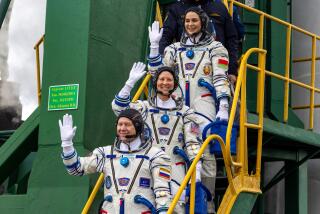In Russia Space Program Heroics, Cosmonaut Snares Crucial Supplies : Success: Loss of wayward vessel could have forced crew to abandon Mir station. Program gets boost.
- Share via
MOSCOW — With Russia’s beleaguered space program on the line, a rookie cosmonaut aboard the Mir orbiting station guided an unmanned, supply-laden freighter to a safe docking by remote control Friday after it twice failed to land on autopilot.
The tricky linkup by Lt. Col. Yuri Malenchenko, a first in Moscow’s annals of space achievement, saved $60 million worth of research equipment, food and supplies for scheduled manned missions with the European Space Agency next month and the United States in March.
Russian space officials said that failure to dock the freighter on the third try would have forced Malenchenko and his two fellow cosmonauts, running low on food, to abandon the Mir station. That, they said, would have delayed or even canceled the joint missions, worth millions of dollars in revenues.
Several dockings between the Mir and American space shuttles are planned in the next two years to gain flight experience for assembling a new station later this decade.
Rockwell International Corp., the Seal Beach-based builder of the shuttles, and McDonnell Douglas Corp.’s space group in Huntington Beach are developing major parts of the new station.
“We were very pleased when we heard of the successful docking,” said Bill Collopy, a Rockwell vice president. The earlier failed attempts “were of great concern” because they “threatened the operation of the Mir,” he added.
Facing his first emergency after two months in space, Malenchenko was under severe pressure. The Itar-Tass news agency declared that the survival of Russia’s space program “now rests literally in the hands of one man.”
Technicians at the flight control center in Kaliningrad guided the 32-year-old cosmonaut through his task by radio as he soared over the Atlantic Ocean late Friday afternoon and burst into cheers when he succeeded.
Malenchenko, a former air force fighter pilot, controlled both the Mir station and the freighter, Progress. From a command module of the Mir, he watched television images beamed from the robot freighter that simulated the view from its driver’s seat.
When the two vessels were about 150 yards apart, space officials said, he activated the remote controls and steered the Progress at about one foot per second toward a conical target two feet in diameter.
“Docking took place on the first attempt,” said Vsevolod P. Latyshev, a spokesman at the control center. “We are so relieved. You could feel the tension.”
Still, the events that led to the emergency were troubling for the space program, which has fallen on hard times since the Soviet Union collapsed three years ago, and for the foreign clients lined up to help revive it.
Cosmonauts shuttle to the space station aboard rocket ships and are resupplied regularly by rocket-borne freighters. But the government-run space agency ran short of cash to pay the newly privatized company that makes the rockets and had to scrap plans for a supply launch in July.
With the Mir station’s food due to run out in mid-September and no backup rocket ready, everything depended on the Progress and its 2.6-ton cargo, launched Aug. 25.
Because budget cuts have closed some ground tracking stations, specialists believed that Russia risked losing Mir, the centerpiece of the space program, if it were left unmanned.
Guided by autopilot, the Progress made two docking attempts, last Saturday and on Tuesday, bumping into the 130-ton space station several times before gliding past. As the freighter ran low on fuel, the space agency decided to try manual docking, which it had never tried with a loaded freighter.
“It is remarkable how Russians heroically create problems for themselves only to resolve them heroically too,” television anchorman Sergei Dorenko said in a special report on the drama.
Space officials have not publicly discussed the docking failures but complain of inadequate government financing for their once-mighty industry.
They are pinning their hopes on $400 million in revenues pledged by NASA over the next four years for U.S.-Russian spaceflights and money from the Europeans for an Oct. 4 blastoff by a German and two Russians.
“Today, we work only four days a week instead of six or seven as we used to,” Latyshev said.
James Oberg, an independent consultant on the Russian space program in Houston, said the crisis showed scientists, engineers and cosmonauts at their best in the face of exhausted resources. “The cosmonauts definitely deserve a feast tonight with all that food they got,” he said. “But they can’t keep going to the edge like this.”
Times staff writer James Peltz in Los Angeles contributed to this report.
More to Read
Sign up for Essential California
The most important California stories and recommendations in your inbox every morning.
You may occasionally receive promotional content from the Los Angeles Times.










